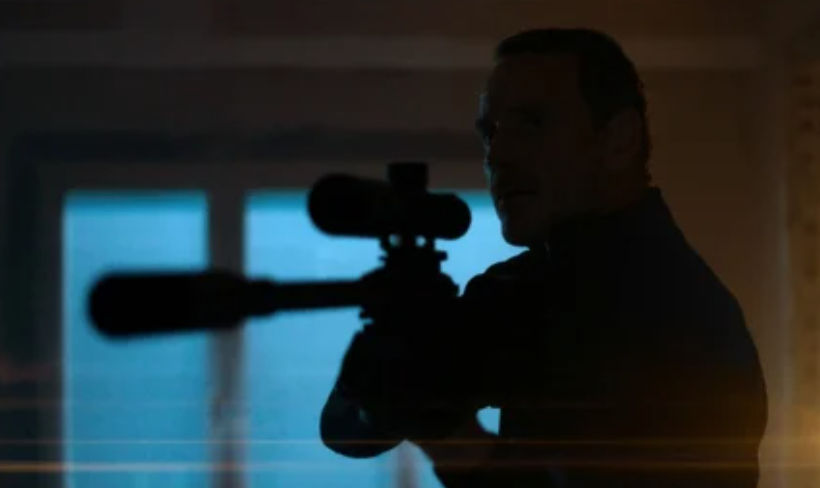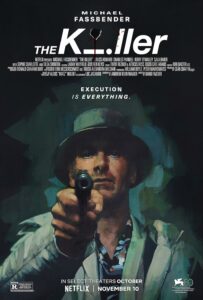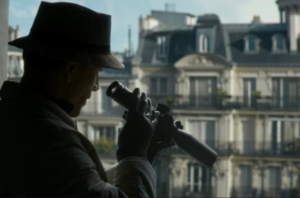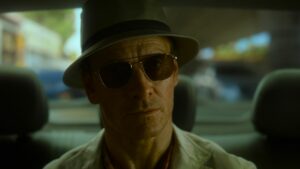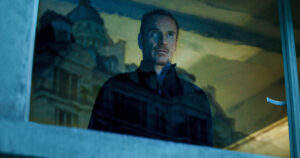Directed by David Fincher | Written by Andrew Kevin Walker, based on the graphic novel by Alexis ‘Matz’ Nolent and Luc Jacamon | 118 min | ▲▲▲▲△ | Netflix
This weekend I read that David Fincher shared rough assemblies of The Killer with fellow director Steven Soderbergh, who helped him edit it. This makes all kinds of sense given this film’s formal, fat-free approach — not a moment wasted, not a shot that doesn’t mean something to the overall narrative. I love this meticulous approach when Soderbergh does it in films like Kimi and Haywire and when Fincher does it in pretty much everything he makes. The Killer is an icy, economical, and pure thriller, its mechanics as engaging as its narrative.
This picture is loosely based on a French graphic novel about an assassin who travels the world killing people, never needing to know why, just wanting to do his job. I read a translated version, which is as much about the psychology of our man as it is about his work. He’s deeply cynical about the world and his place in it. His monologues as he prepares to end the lives of his targets inspired much of the opening of this film as the nameless killer, played by Michael Fassbender, waits in an empty apartment in Paris to murder a man. In a weird way, this is a workplace drama while also being another one of Fincher’s capitalist critiques, so then connected to Fight Club and The Social Network, while also being about a serial killer, so akin to Zodiac, The Girl With The Dragon Tattoo, and Gone Girl.
In the film the killer makes an error and, in the days following, finds his sanctum sanctorum in the Dominican Republic has been violated, his girlfriend assaulted. From here on he’s tracking the people who have been working against him, tying up loose ends in New Orleans, Florida, and somewhere near New York City. What follows includes bursts of brutal violence, slices of deadpan commentary, and more planning than a heist movie.
This is not deep, but it is effective. There’s nothing in the American cinema landscape quite like the fastidious approach of a David Fincher film, and here he’s found a protagonist who’s analogous to his own process. Just as the killer sticks to the plan with a chilly efficiency, so too does Fincher with his hovering, omniscient camerawork haunted by a buzzy electronic score from frequent collaborators Trent Reznor and Atticus Ross. (The killer actually prefers songs by The Smiths to soundtrack his work, his taste remaining a mystery.)
The movie also isn’t without a mordant wit — fans of 1970s American sitcoms will recognize the names of the killer’s cover identities when he needs to step on a plane or across an international border. Fincher references thrillers of the past, including Lawrence Kasdan’s Body Heat in a monologue where the killer talks about not being able to anticipate every mistake, admitting he’s no genius. The work of Soderbergh, Stahelski, Mann, Melville, Kubrick, and so many others run through this picture like an electrical current.
Fassbender hasn’t been onscreen a whole lot in recent years, but in this return he seems to have become even leaner and more cadaverous, bringing a method-like, unblinking intensity to a character so disciplined it must have taken an incredible physical discipline to play him — The Killer doesn’t work without him. Fincher populates his film with a collection of quality character actors and a lovely, brief scene with an elegant Tilda Swinton.
Do we ever feel anything for anyone onscreen? Perhaps not, and while this film probably isn’t as much fun as, say, Haywire, which had a playfulness to it, it’s in the construction where you’re likely to find satisfaction, that mirroring of process and filmmaker. Sometimes a cigar is just a cigar, or a firearm just a firearm.





